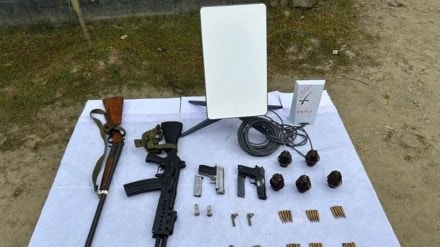In a significant development, the Army and Assam Rifles have recovered a Starlink satellite internet device in the violence-ridden state of Manipur. This recovery, which took place on December 13, 2023, is raising serious concerns about national security, particularly regarding the potential use of such devices by insurgent groups in the region. Manufactured by SpaceX, the company founded by American billionaire Elon Musk, Starlink devices operate through a constellation of low Earth orbit satellites, offering internet connectivity even in remote and isolated areas. The device was found during a joint operation conducted by the Army, Assam Rifles, and local police in the districts of Imphal East, Chandel, Churachandpur, and Kangpokpi.
The Recovery Operation: A Joint Effort
According to the Spear Corps post on ‘X’, the recovery was made after specific intelligence was gathered. Security forces carried out a series of raids in the affected districts of Manipur, a region that has been grappling with ethnic violence for over a year and a half. In addition to the Starlink device, the operation also yielded a substantial cache of weapons, including 29 firearms, sniper rifles, automatic weapons, grenades, and ammunition. Among the seized items, the Starlink satellite kit stood out, primarily due to its potential use by insurgent groups.
Images released by the military revealed that the device consisted of a Starlink receiver and a router, which are integral parts of the satellite internet system. However, the identity of the group in possession of the device has not been officially disclosed. The device bore inscriptions of the RPF/PLA (Revolutionary People’s Front/People’s Liberation Army), both militant organizations active in the region.
Ministry of Defence statement
Lt Col Amit Shukla, Imphal-based regional spokesperson of the Defence Ministry, said that over the past one week, the Army and Assam Rifles, along with the Manipur Police, have been carrying out raids in Imphal East, Chandel, Churachandpur and Kangpokpi districts. During the raid, security forces recovered 29 different weapons, ammunition and war material.
During the same raid, a 5.56mm M-4 assault rifle, a single barrel rifle, two pistols, grenades and a Starlink internet kit along with bullets were recovered from the Irilbung police station area of Imphal East.
The Implications for National Security
The recovery of the Starlink device is a cause for alarm, as it suggests that insurgent groups in Manipur may be circumventing the government-imposed internet shutdowns that have been in place for security reasons in the region. The Indian government has periodically cut off internet access in areas affected by unrest to curb the spread of misinformation, violent propaganda, and coordination among separatist groups.
Starlink’s ability to bypass these restrictions poses a significant challenge for law enforcement and national security agencies. Unlike conventional internet services that rely on ground-based telecom infrastructure, Starlink connects directly through satellites, enabling communication even in areas where traditional services are unavailable or deliberately disabled. This capability makes it particularly attractive to militant groups that operate in remote and conflict-prone zones like Manipur.
The situation is further complicated by the fact that Starlink has not yet been granted a license to operate in India. The company has been seeking regulatory approval for satellite broadband services in the country, but has yet to meet the requirements for a license. Given that Starlink devices are not supposed to operate within India without government authorization, security agencies are investigating how the device made its way into the region and whether it was smuggled across the border from neighbouring Myanmar.
Starlink’s Role in Global Conflicts
Starlink’s potential use in insurgencies is not limited to India. The satellite system has gained significant attention for its role in conflict zones, most notably during the ongoing war in Ukraine. When Russia targeted Ukraine’s telecommunications infrastructure, Starlink became a crucial lifeline for the Ukrainian military and civilians, enabling them to maintain communication despite widespread destruction. The use of Starlink by insurgent groups in India could mirror this pattern, offering them a secure and independent means of communication in areas where other infrastructure is either unavailable or under surveillance.
The Border Security Challenge
The issue of Starlink’s potential use in insurgencies is not unique to Manipur. Similar concerns have been raised by Indian security agencies in other regions, particularly along the porous borders with Myanmar, where weapons and contraband are frequently smuggled. The discovery of a Starlink device in the Andaman and Nicobar Islands in November 2023, along with a massive seizure of drugs, highlighted the growing challenge of controlling satellite-based communication devices in areas that are difficult to monitor.
In Manipur, where insurgent groups have been active for decades, the proliferation of such technologies could further complicate efforts by security forces to curb the violence. The presence of a Starlink device with insurgent groups points to an increasing reliance on sophisticated technologies that are difficult to trace and intercept.
Legal and Regulatory Concerns
Starlink’s operation in India raises a number of legal and regulatory issues. The Indian government has yet to auction satellite spectrum for services like Starlink, and the telecom sector has been hesitant to allow foreign companies like SpaceX to operate without strict regulatory oversight. As of now, Starlink is not authorized to offer commercial satellite broadband in India. The discovery of Starlink devices in the hands of militant groups underscores the potential risks of unregulated access to advanced communication technologies.
Despite these challenges, SpaceX has been seeking the necessary licenses to enter the Indian market, and it is expected that, should it fulfil the government’s requirements, the company could eventually offer satellite broadband services in the country. However, the recent seizures in conflict zones highlight the vulnerabilities of unregulated access to such services, especially when used by criminal and insurgent networks.
